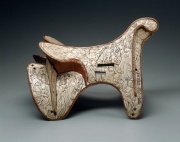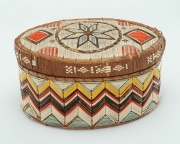Difference between revisions of "Birch bark"
Jump to navigation
Jump to search
| (One intermediate revision by the same user not shown) | |||
| Line 10: | Line 10: | ||
== Physical and Chemical Properties == | == Physical and Chemical Properties == | ||
| − | Soluble in organic solvents.Insoluble in cold water.Thickness = 0.2-0.5 mm. | + | * Soluble in organic solvents. |
| + | * Insoluble in cold water. | ||
| + | * Thickness = 0.2-0.5 mm. | ||
== Additional Images == | == Additional Images == | ||
<gallery> | <gallery> | ||
| − | File:63.289_EMaPQBB_overall.jpg|Birch bark example | + | File:63.289_EMaPQBB_overall.jpg|Birch bark example<br>MFA# 63.289 |
| − | File:63.289_Birch_det.jpg|Birch bark | + | File:63.289_Birch_det.jpg|Birch bark detailed<br>MFA# 63.289 |
</gallery> | </gallery> | ||
Latest revision as of 15:43, 7 May 2022
Description
Thin sheets peeled from the inner bark of the Birch tree. Birch bark was used as a textile and writing paper in India and the Far East from at least the 2nd century. For preparation, the strips were pulled from the tree, dried, then softened with oil (Batton 2000). The strips were laminated using a natural Gum then flattened between wooden covers.
Synonyms and Related Terms
birch bark paper; birchbark paper; birch-bark paper; bhoja-patra
Physical and Chemical Properties
- Soluble in organic solvents.
- Insoluble in cold water.
- Thickness = 0.2-0.5 mm.
Additional Images
Resources and Citations
- S.S.Batton "Seperation (sic) Anxiety: The Conservation of a 5th Century Buddhist Gandharan Manuscript" WAAC Newsletter, 22(1):15-17, 2000. O.P.Agrawal, "Investigations for Preservation of Birch-Bark Manuscripts" in Preprints of ICOM Committee for Conservation , Ottawa, 1981.
- Matt Roberts, Don Etherington, Matt Roberts, Don Etherington, Bookbinding and the Conservation of Books: a Dictionary of Descriptive Terminology, U.S. Government Printing Office, Washington DC, 1982



